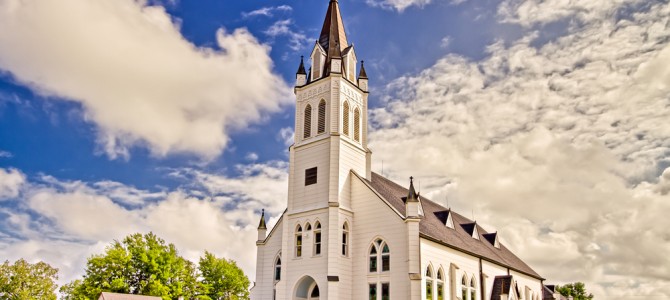
The latest cultural battle on Indiana and Arkansas’s religious-freedom laws has made it clear that American citizens no longer understand our nation’s founding principles. Shouting fire in a crowded theatre has been replaced by shouting “bigot” in the public square. The irony is that the secular push to discriminate against religion will result in a closer relationship between church and state.
To understand where we are headed, it’s illustrative to recount where we have been: the founding of the Church of England in 1530 by Henry VIII to create a church that reflected the trendy needs of the state. This monarch wanted a divorce and the pope that would not accommodate him. So Henry appointed himself the supreme governor of the church, causing the church to perform a number of official functions, and keeping the church and state tightly linked.
The secular Left today has much in common with Henry the Eighth. The consolidation of church and state give them fewer variables to manage and thus control. Being secular, they default to the state as their religious entity and likely see many advantages in consolidating the two, just like Henry. And Henry the Eighth’s action was in many ways responsible for the founding of this country, if one remembers the journey of the Pilgrims to Plymouth Rock in 1620. This group of separatists departed England so they could practice their religion free of the state’s dictates. For them, not belonging to the Church of England meant not obeying the King James I, so they had no other choice but to start a new life in New World.
When an Industry Gets in Bed with the Government
To provide a modern parallel, it may be worthwhile to walk through how other actors have slowly capitulated to a higher power as government has grown in the United States. You may remember that Amazon for years benefited from having no sales tax applied to their goods across state lines. Their efforts to initially preserve that benefit for all Americans who purchase goods online were universally beneficial.
As Amazon has grown, they’ve softened their stance on sales tax collection. One part of that is likely capitulation from government pressure, but a second part is that they get to keep out new entrants in their space—new entrants like Amazon when it was smaller. That’s because Amazon is large enough to spread the cost of goods sold across their supply chain. They now can use their size as a competitive advantage.
The best way to maximize a dominant industry player’s advantage is to lobby government. Once Amazon realized its next goal was same-day shipping, that meant they’d need many local distribution hubs. That made the sales tax position they had held no longer a goal. Former Sen. Jim DeMint called them out: “I’ve been here a long time and I’ve seen many businesses that used to be small, they grow. Then they use their political clout to come here, to advantage themselves and to erect barriers to entry for smaller companies.”
How Churches Will Put Nails In Their Own Coffins
That model of a fantastic start-up slowly caving to government oversight, then realizing its competitive advantage through government coercion rather than competition will be what happens to our places of worship. Instead of Henry VIII having to create the Church of England, churches will facilitate their own demise. As agitators continue to push religion out of the public square, the logical response will be to do what many businesses have.
These attacks may initially be fought with noble means. But, eventually, it will be clear to one sect or the other to take advantage of the “opportunity” to pursue a new “partnership” with the state. Just like any company who thought its ideas and products were enough, then got big enough to realize that the federal government wants its cut, churches will realize that, to protect their freedoms they will have to pay Uncle Sam, their senators, representatives, president, chairmen, and other sundry government officials.
As checks get cut and compromises get drawn that reflect the political sensibilities of those in office, churches will no longer retain their independence from the state. Sure, tax-exempt status and other benefits matter, but the long game is to create our new Church of England, a church that reflects the beliefs of those who inhabit the high echelons of society, a belief system that allows for their deviations from moral expectations while promising them redemption. Even better, this would foster a quieter public square more amenable to government action, with a church that endorses and magnifies government action instead of one that may at times dissent.
As a people, we sailed away to escape a country that had annihilated the concept of separation of church and state. The secular Left in the United States often stresses that separation, but ironically only a strong central government can use force to bend religious people. A government that suppresses religious belief is one that enforces a particular religious belief. We have a government in search of a church that will fit the government’s purpose versus a higher one.
This puts us back to where we started, as the separation of church and state narrows by the day. The Religious Freedom Restoration Act and First Amendment don’t exist just to protect some people. They protect all of us from a state-run religion. Without the capacity to run independent religious entities, we only have the individual and the state. This will eliminate religion, not balance it with the public good.
Cutting people off from finding their own spiritual path and forcing them to accept the one the government allows is not progress. We are retreating as a nation, reverting to a lesser form of government with less vitality. Much of what makes the United States exceptional lies within the space we carved out for independence from the state. To sacrifice that now means settling for a diminished future.









